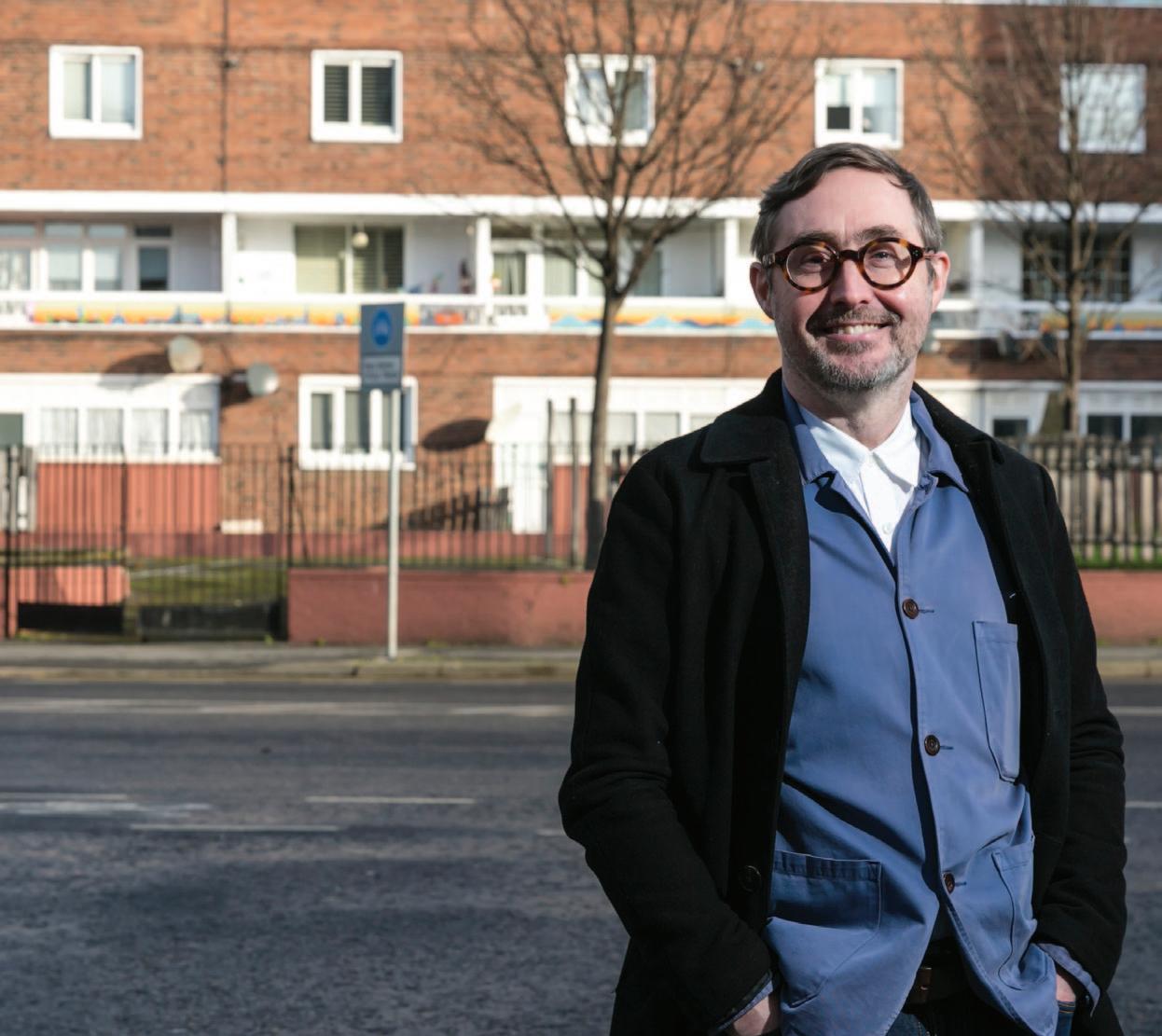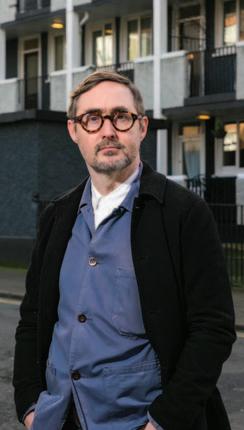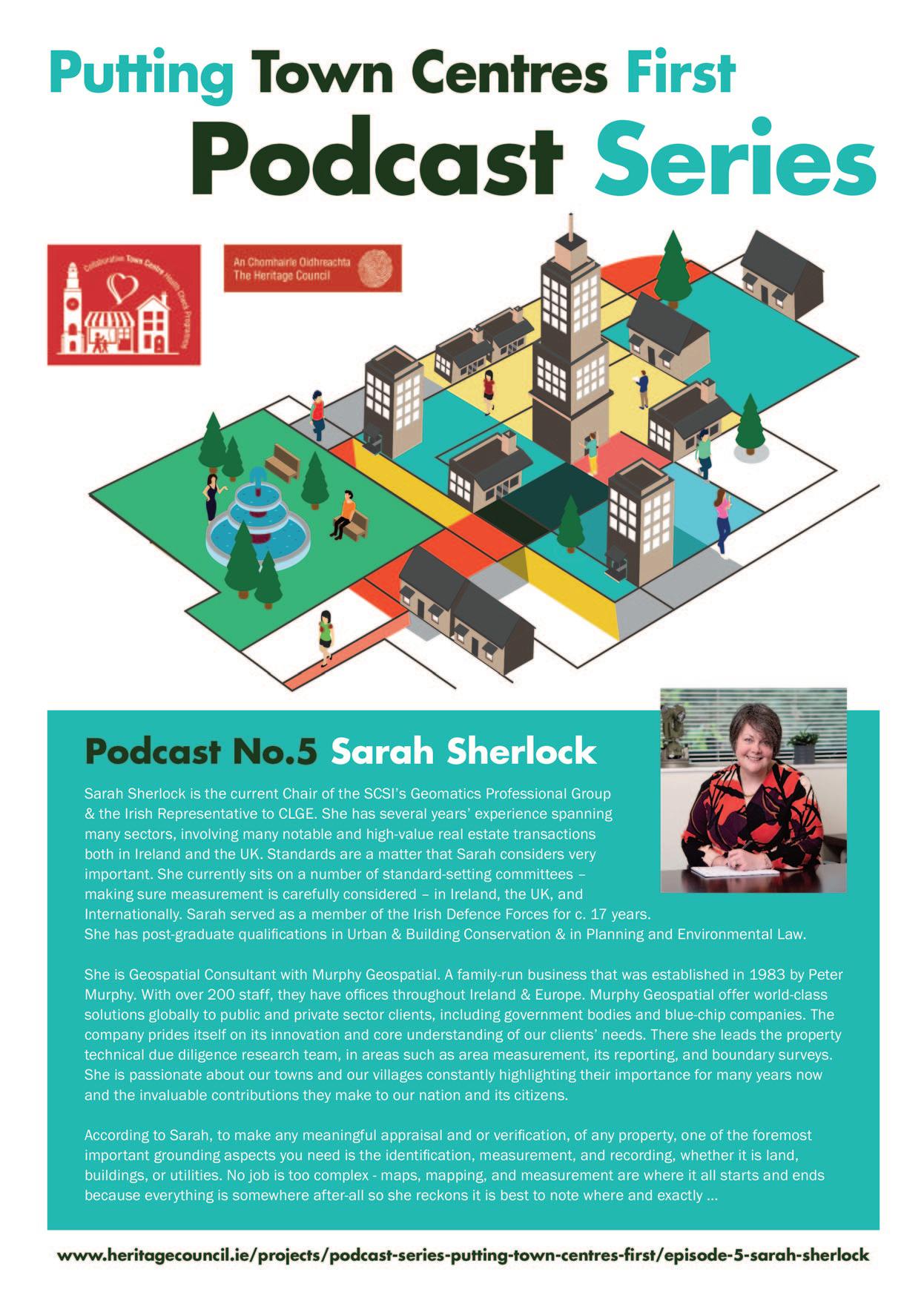
10 minute read
What we mean by homen
from Surveyors journal
by Th!nk Media
WHAT WE MEAN BY HOME
SINN FÉIN HOUSING SPOKESPERSON EOIN Ó BROIN TALKS ABOUT THE NEED FOR A PARADIGM SHIFT IN HOUSING POLICY IN IRELAND, AND HOW TO BRING IT ABOUT.
Housing has long been a major, and often controversial, political issue the case for a radical shift in thinking about how we provide housing, and this is reflected in Sinn Féin’s housing policy, which calls for a appropriate infrastructure and services. He points out that this is not a new idea; it’s something the Irish State has done in the past in Ireland, and few politicians massive local authority building programme, in areas like Marino in Dublin. However, he says are regarded as having immersed themselves which it says will provide affordable, mixed- changes in financial, and ideological, models as deeply in the issues as Sinn Féin’s housing income developments where tenure and since the 1980s have meant that development spokesperson Eoin Ó Broin. His 2019 book, housing types are tailored to the long-term is “driven by the diktats of finance rather than Home: Why public housing is the answer, makes needs of communities, backed up by housing need”. The result is the current
INTERVIEW
Ann-Marie Hardiman Managing Editor, Think Media

We may not know when the next general election will take place, but like any politician Eoin is hoping that his party will be in Government, and that he will have the opportunity to put these plans into action as Minister for Housing. So what are the first three things he would do as Minister? “First thing is we announce that we’ve kept our promise, that the capital budget for public housing will double. The second is to introduce legislation to ban rent increases for three years, and provide a refundable tax credit for renters to bring their rents down. One in four households in Dublin rent, and they are some of the most precarious in our housing system. We have to give them help now. “The third is to set a date for legislation on a referendum on enshrining the right to housing in the Constitution. While doing this won’t build a single house, it will allow us to have a national conversation about what we mean by home”.
situation, where large numbers of people on modest incomes cannot afford to rent or buy a home. The answer, Eoin says, is to dramatically break with the current model, to break the link between land values and house prices, and the key to this is public development of housing on public land in urban centres: “The State has lots of land in those areas and that land has lower existing use values. The State doesn't have to charge a 10-15% margin and profit, doesn't have high financing costs, and the build costs should always be roughly equivalent in two comparable developments, whether public or private. If the State doesn't have the same soft costs as the private sector, then the public sector as a developer, or its agents as developers, can deliver much greater affordability”.
The plan
As he says, these aren’t new ideas, but how are they to be brought to fruition? There are a number of elements, the first of which is an unprecedented level of State investment: “This can't be about tinkering around the edges. We have to introduce a new development model, backed up by a level of capital investment by the State not seen in the entire history of the island. That's the kind of circuit breaker that allows you to make those bigger interventions”. The second factor is that idea of public housing on public land enabling true affordability. But Sinn Féin’s proposals go further: “There will be a percentage of people who will buy their homes. The big difference between our proposal and everybody else's is they would own that house outright, but they would not buy the land. What we would be saying to the purchaser is: this is your home. You control it in exactly the way any other private homeowner does. But there are two conditions to the leasehold on the land that we are giving you at no cost in perpetuity. You can never rent it in the private rental sector, and you can never sell it into the private market. You can sell it to another affordable purchaser, index-linked, for example, to inflation and home improvements. What that would mean is, over a decade or two, we would build a stock of permanently affordable and tradeable homes”.
Where there’s a will
He also makes the case that there’s never been a better time to make these radical changes: “We’re at that moment now: negative or near to negative interest rates, flexibility in the EU's fiscal rules, huge demands from industry, from the chambers of commerce and from Ibec, not only to invest in infrastructure, but to mitigate against rising wage claims because of rising housing costs”. He feels that public opinion is at a tipping point too, as so many people are directly affected by the housing crisis and need solutions. Covid-19 also presents opportunities, both in terms of availability of skilled labour, which can be diverted from delayed or abandoned projects, and in terms of land that may be available to purchase from developers: “I'm a developer. I have five sites. I have two too many, given the changing conditions of Covid. The State will come in and buy them off me at cost. I can push ahead with my other three and the State can transform those into public developments in the way that I have outlined. There's all sorts of things that are available right now, but that window of opportunity doesn't last forever”. Ultimately it comes down to political will. Eoin compares it to the kind of bravery and determination that led Donagh O’Malley to introduce free secondary education in Ireland, or Aneurin Bevan to create the NHS in Britain. He also argues that this model will benefit the private sector as well, for example in muchneeded reform of tendering and procurement: “At Dublin City Council when they're going out to tender for larger apartment-based residential development, a tiny number of companies are able to tender, maybe two or three. We would completely shake up the tender and
procurement system, create far greater access for medium-sized contractors, for regional contractors. We would create far greater access for young architects through architectural competitions. What we’re looking to do is have more public sector-led development in parallel to the private sector-led development, but also to reform the overall system so that everybody gets a fair share of the work that’s there”. Role of the SCSI Eoin welcomes the SCSI’s reports, in particular its recent report on the cost of apartment delivery in Dublin: “What's really helpful about the reports is they give us a view over a number of years about what’s happening. We've now thankfully got more data from the public sector side as well. are living the housing crisis. The more information we can put in the public domain to have an evidence-based conversation about this, the better”. He would like to see more voices join the call for a paradigm shift in housing policy: “I don’t believe anybody out there believes our current system is working. I think in some senses, the reason why the SCSI releases those reports is, they might not shout from the rooftops we need the paradigm shift, but nobody reading that report can honestly say that that doesn’t provide us with evidence that something is broken and needs to change”. “THE MORE INFORMATION WE CAN PUT IN THE PUBLIC DOMAIN TO HAVE AN EVIDENCEBASED CONVERSATION ABOUT THIS, THE BETTER. We're finally getting a level of transparency that we didn’t Creating the 15-minute city have before. Could it be better? Absolutely. And one of the Ireland’s strong cultural pull towards home ownership, and indeed towards the threeSCSI’s recommendations around a kind of a standardised bedroom semi in the suburbs, coupled with the perceived lack of long-term security reporting formula for construction in the public and private in the rental sector, might make these proposals a hard sell. Eoin disagrees: “No sector is absolutely crucial”. society is genetically predisposed to any form of tenure or any typology of housing. He sees the report’s findings around the cost of Our problem is that over a century of Government housing policy, the only secure construction as vital: “What the SCSI report shows us very tenure was home ownership. If we want people to live in different types of tenure, clearly, as did all of the reports, is that the cost of then we have to make it secure for the full work cycle. That means, for example, our construction is the cost of construction. It hasn't moved cost rental models also have to work out what happens when I reach pension age dramatically since 2016/2017. While comparing two sites is and my income drops dramatically”. always difficult because you have different abnormals, He wants to see reform of the rental sector too: “Our current system is bad for landlords when you cut out the abnormals, the cost per square metre and tenants. If we had tenancies of indefinite duration, if we had rents linked to an index is the cost per square metre. The conclusion to draw from such as the consumer price or some other, if we had a proper way of enforcing RTB that is that construction is not our problem. Our problem is determinations in the interests of landlord and tenant, and if we taxed all landlords fairly, the all-in cost of development”. then private rental would be more secure, both for the landlord and tenant”. He feels the SCSI’s role is important at all levels: “The great When we talk about housing, the 15-minute city is a concept that is much discussed. value of an organisation like the SCSI is they straddle the For Eoin, this is something we had in our urban centres, and have lost: “People talk public and private sectors, not just because they have about the 15-minute city as if it’s some new radical idea. That’s what the Liberties people who work in both, but also their sons and daughters was. And we moved those people to the suburbs. “What is it people look for in where HOME they choose to live? They want affordability, they want comfort, they Eoin Ó Broin is from Cabinteely in Co. Dublin. He holds a degree in want access to services and they want Cultural Studies from the University of East London and an MA in to be part of a community. The Irish Politics from Queen’s University Belfast. His interest in housing difficulty is, those things aren't began during his time serving on Belfast City Council, representing available in our city centres. If we a constituency in north Belfast where housing was a major political provide, not just apartments, but issue. On his return to Dublin, he spent three years as a policy officer integrated, mixed-use developments and legislative advocate for Focus Ireland. His interest continued that have schools and parks, that are when he was elected to South Dublin County Council, and he was on high-frequency public transport appointed Sinn Féin Spokesperson on Housing on his election to Dáil links and that have really good walking Éireann in 2016. He is currently undertaking a master’s in urban and cycling permeability as a matter of regeneration and planning at Technological University Dublin. course, what sensible person wouldn't choose that if the price is right?”












